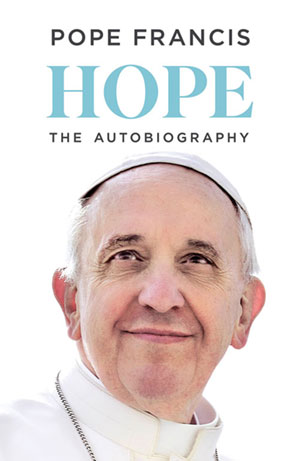Pope’s autobiography reveals a shepherd’s heart, full of hope
Reviewed by Daniel Conway
 Hope: The Autobiography of Pope Francis is not about the life of Jorge Mario Bergoglio (Pope Francis). It’s about his heart—what he loves, what he detests, what he is afraid of and, above all, what he hopes for.
Hope: The Autobiography of Pope Francis is not about the life of Jorge Mario Bergoglio (Pope Francis). It’s about his heart—what he loves, what he detests, what he is afraid of and, above all, what he hopes for.
In Hope, Pope Francis describes his passion for people like his grandparents and his father who made the dangerous journey from their homeland in Italy to the new world of Latin America. Their story resonates with the heartbreaking stories of millions of migrants in every region of the world, who have been forced to leave their homes in search of freedom, safety and economic prosperity. Pope Francis is the child of immigrants, and he is appalled by the indifference and animosity shown toward migrant families.
The Holy Father is also an eyewitness to the horrors of war and the cruelty caused by political regimes that oppress their people. Hope chronicles the experiences of World War I, as told to the young Jorge Bergoglio by his paternal grandfather. It then proceeds to recount the experiences of Jews and many other émigrés who fled the Nazi madness and resettled in Latin America. It also acknowledges the pro-Nazi activities of right-wing extremists in post-war Argentina.
“War is madness,” the pope says repeatedly. Nothing good ever comes from war, and the costs are always prohibitive. The sight of elderly women, grandmothers, wandering through the rubble of cities devastated by bombs, brings Pope Francis to tears.
As a young Jesuit, he had asked to be sent to Nagasaki, Japan, as a missionary to minister to victims of the atomic bomb dropped on the city. The fact that he had recently had a portion of his lung removed prevented him from traveling there, but his desire to help people affected by the vicious cycle of preparing for, and engaging in, modern warfare has never left him.
Climate change has infuriated him since as a young priest he witnessed the devastation caused by the corporate greed and government impotence that have exploited natural resources, uprooted families and destroyed local cultures. He insists that the poor suffer most from the neglect and abuse of the planet Earth, our common home.
Pope Francis has a warm and generous heart. He loves children and he loves to dialogue with (and learn from) young people who are passionate, challenging and full of life. He detests all forms of rigidity. He abhors reactionary politics—in society and in the Church—calling attention to our Lord’s rejection of hypocrisy in all its forms.
Smiles and laughter engage the pope’s passion. He counsels us not to be “sourpusses,” but to be lighthearted and able to laugh at ourselves. The smiles of children give him special joy.
Pope Francis does not take himself too seriously. He rejects efforts to make him into “a great man.” He is a sinner, he tells us, like everyone else. God’s grace makes it possible for him—and all of us—to move beyond our sinfulness and to change our lives. But the pope does take seriously his ministry as pastor of the universal Church. In this role, he reaches out to everyone—all nations and peoples, all religions and cultures, poor and rich alike. Everyone.
Synodality—which involves dialogue, attentive listening and mutual respect—is the way Pope Francis wants the Church to exercise leadership. He is a man of the Church. He is not interested in changing dogma, but he also has no interest in forcing Church teachings on anyone. We are all pilgrims on a journey, the pope says, and our choice is either to walk together side-by-side and help each other, or to stand alone full of sadness and despair.
As the title of his most personal book suggests, the pope is a man of hope. Of the three theological virtues (faith, hope and charity), Pope Francis believes that hope is the most elusive, but also the most important to our ability to move forward and build a better world. “Hope does not disappoint,” he reminds us (Rom 5:5). And hope leads inevitably to its sister virtues of faith and love.
The heart of Pope Francis is revealed in all its richness in Hope. With laughter and joy, with sadness and righteous anger, and above all with a hope that does not disappoint, the grandson and son of Italian immigrants shares his tender and expansive heart with us.
It’s a story that deserves to be told.
(Daniel Conway is a member of The Criterion’s editorial committee.) †
